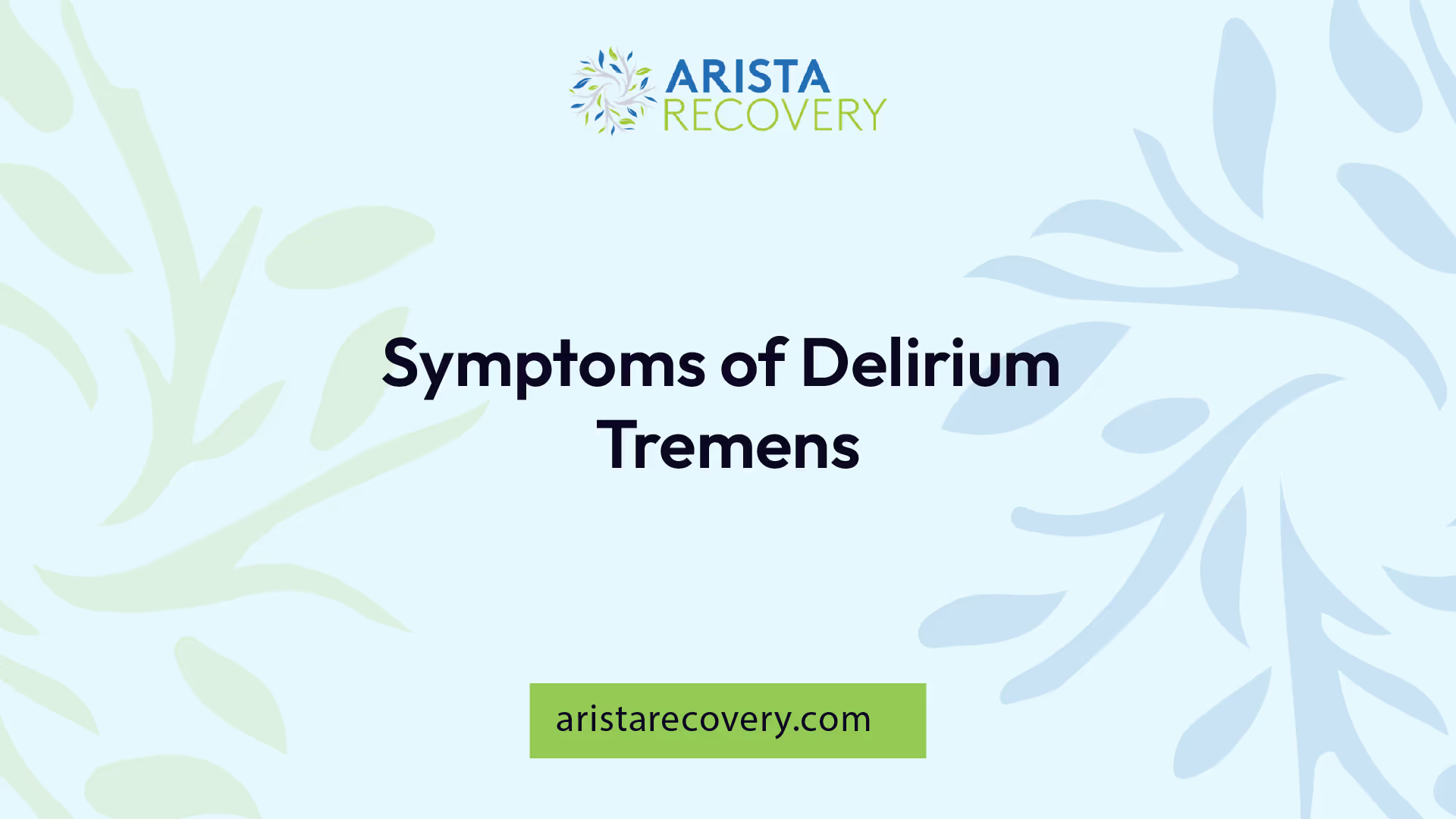Recognizing Delirium Tremens Symptoms

Understanding Delirium Tremens
Delirium tremens (DTs) is a critical and severe condition that can occur during alcohol withdrawal, particularly among individuals suffering from alcohol use disorder. Recognizing the signs and understanding the risk factors associated with this condition is crucial for timely intervention and treatment.

Definition and Overview
Delirium tremens, often referred to as DTs, is the most severe form of alcohol withdrawal. It can sometimes be life-threatening, especially when someone with an alcohol use disorder suddenly ceases drinking entirely. DTs typically emerge between one and three days following the last drink and reach their peak intensity around four to five days after the final drink.
DTs is one of the most severe manifestations of alcohol withdrawal, usually occurring after protracted periods of heavy drinking, particularly in those with a history of chronic alcohol use. It is a rare, life-threatening condition, with only about 5% of people who abuse alcohol exhibiting symptoms of delirium tremens. Symptoms can range from irritability and confusion to tremors, nausea, vomiting, and seizures.
Risk Factors
Delirium tremens primarily results from extended periods of heavy drinking, as opposed to an isolated episode of binge drinking. Individuals who consume very large quantities of alcohol daily for at least several months are more prone to develop delirium tremens. The longer one drinks regularly, the higher the risk for developing DTs.
The risk of delirium tremens is more prominent in individuals with moderate or severe alcohol use disorder. Almost one-third of U.S. adults will experience alcohol use disorder at some point in their lives, and it is estimated that about 1% to 1.5% of those people may get delirium tremens.
If untreated, delirium tremens can induce severe symptoms, including heart attack, stroke, and death. Therefore, it is crucial to recognize the signs of delirium tremens early and seek immediate treatment for the condition. To grasp more about the withdrawal symptoms related to alcohol use disorder, visit our article on alcohol withdrawal symptoms.
Symptoms of Delirium Tremens
Recognizing the symptoms of delirium tremens is crucial for those suffering from alcohol addiction. This condition represents the most severe form of alcohol withdrawal and can sometimes be life-threatening, especially when someone with alcohol use disorder suddenly stops drinking entirely. It typically appears between one and three days after the last drink and is most intense four to five days after the last drink.

Confusion and Disorientation
Confusion and disorientation are among the main delirium tremens symptoms. Those experiencing this severe form of alcohol withdrawal may have trouble understanding what is happening around them, making it difficult for them to make informed choices about their care [1].
This acute state of confusion usually starts between 2 and 4 days following the cessation of alcohol consumption. However, in some cases, symptoms may not show up until up to 10 days after giving up alcohol.
Hallucinations and Agitation
Hallucinations are another symptom of delirium tremens, which tend to begin shortly after stopping alcohol use, typically emerging within 12 hours to about 3 days. While hallucinations can be alarming, it's important to note that they occur in a very small number of people during withdrawal [3].
Agitation, characterized by irritability and restlessness, is another common symptom of delirium tremens. This may be accompanied by physical symptoms such as tremors, nausea, vomiting, and in severe cases, seizures [2].
These symptoms can be extremely distressing for the individual experiencing them and can pose significant health risks. If you or someone you know is showing signs of delirium tremens, it's important to seek immediate medical attention. For more information on managing these symptoms, please refer to our article on delirium tremens treatment.
Remember, the best way to prevent delirium tremens and other severe alcohol withdrawal symptoms is to seek professional help when trying to overcome alcohol addiction. This ensures a safer, monitored withdrawal process and provides the person with the necessary support to manage the symptoms effectively.
Treatment Options for Delirium Tremens
When it comes to managing delirium tremens symptoms, prompt and effective treatment is crucial. This is because delirium tremens is a severe form of alcohol withdrawal and can be life-threatening if left untreated [2]. The treatment typically involves two primary strategies: the use of medications and sedatives, and supportive care and monitoring.

Medications and Sedatives
The primary course of treatment for delirium tremens involves the use of sedatives, usually benzodiazepines, to calm the excited nervous system. These medications work by reducing the overactivity in the brain that triggers the severe symptoms of delirium tremens. This results in a calming effect that helps to manage symptoms such as agitation, restlessness, and hallucinations.
In severe cases, anesthesia may be prescribed to sedate the individual until symptoms end. This is usually reserved for situations where other treatments have not been effective or when the individual's symptoms are especially severe.
Other medications may also be administered as part of the treatment plan. These can include drugs to control seizures, manage symptoms of psychosis, or treat any co-occurring conditions that the individual may have. For more detailed information on the medication aspect of delirium tremens treatment, visit delirium tremens treatment.
Supportive Care and Monitoring
In addition to medications and sedatives, individuals with delirium tremens often require supportive care and monitoring to manage their symptoms. This can involve intravenous fluids with vitamins and minerals to treat dehydration or bring electrolytes back into balance.
Supportive care also includes monitoring vital signs and adjusting treatment as necessary. This is because individuals with delirium tremens can be at risk for serious complications, such as abnormal heart rhythms or an inability to effectively regulate body temperature [2].
The goal of supportive care and monitoring is to ensure the safety of the individual during the detoxification process and to minimize the risk of complications. This is a critical part of the treatment process and can play a significant role in the individual's recovery.
In conclusion, treatment for delirium tremens is a multi-faceted approach that involves the use of medications and sedatives, along with supportive care and monitoring. It's important to seek immediate medical attention if you or a loved one are experiencing symptoms of delirium tremens, as it is a medical emergency that can be fatal if left untreated.
Duration and Prognosis
The course and outcome of delirium tremens can vary greatly depending on a variety of factors, including the individual's overall health and the severity of their alcohol dependence.
Typical Course of Delirium Tremens
Delirium tremens (DTs) generally lasts up to seven days, with some individuals experiencing symptoms for up to two weeks. However, the severity and duration of DTs vary between individuals. If a person continues to drink after detoxing from alcohol, they are more likely to experience delirium tremens in the future.
Survival Rate and Complications
Without treatment, about 15% of people with delirium tremens (DTs) do not survive, but with treatment, the survival rate is about 95%. Early treatment increases the odds of survival and a positive outcome.
Delirium tremens should always be treated as a medical emergency, as it can be fatal if left untreated. Death commonly results from an inability to effectively regulate body temperature, abnormal heart rhythms, worsening of seizures due to alcohol withdrawal, and/or exacerbation of existing medical issues.
For individuals struggling with alcohol addiction, understanding the potential severity of alcohol withdrawal symptoms, including delirium tremens, is crucial. Learn more about severe alcohol withdrawal and acute alcohol withdrawal to help recognize the signs early and seek necessary delirium tremens treatment promptly.
Prevention of Delirium Tremens
Prevention is the best approach to managing delirium tremens, a severe form of alcohol withdrawal. The strategies for prevention primarily involve avoiding alcohol and seeking medical guidance.
Avoidance of Alcohol
The only definitive way to prevent delirium tremens (DTs) is to avoid alcohol entirely. This condition results from prolonged periods of heavy drinking and is more likely in people who consume large amounts of alcohol daily for several months.
Nearly one-third of U.S. adults will experience alcohol use disorder at some point in their lives, and about 1% of those individuals may develop delirium tremens. Therefore, it is crucial to understand the risks associated with heavy drinking and take steps to moderate or eliminate alcohol consumption.
For more detailed information on this topic, consider reading our article on alcohol withdrawal symptoms.
Seeking Medical Guidance
If someone with alcohol use disorder wants to stop drinking, they should seek medical guidance to reduce alcohol intake safely and improve their chances of a positive outcome.
Delirium tremens is a medical emergency and can cause severe symptoms, including heart attack, stroke, and even death if left untreated. Therefore, it is crucial to seek immediate medical attention if you or someone you know begins to show delirium tremens symptoms.
Medical professionals can provide effective treatment options for delirium tremens and guide individuals through the process of reducing alcohol intake safely. They can also offer resources and support for individuals coping with alcohol use disorder, helping to prevent severe withdrawal symptoms and improve overall health outcomes.
Prevention is the first line of defense against delirium tremens. By avoiding alcohol and seeking medical guidance, individuals can significantly reduce their risk of developing this severe and potentially fatal condition.
Impact of Delirium Tremens
Delirium tremens, also known as DTs, is a severe medical condition that results from sudden withdrawal from alcohol, particularly in individuals with a history of heavy, prolonged drinking. The impacts of this condition are both physical and psychological, and can have long-term implications if not promptly and correctly treated.
Physical and Psychological Effects
The physical and psychological effects of delirium tremens are severe and can sometimes be life-threatening. This condition, being the most severe form of alcohol withdrawal, occurs when someone with moderate or severe alcohol use disorder abruptly ceases drinking [1].
Physical symptoms include confusion, hallucinations, and agitation, which are also symptomatic of severe alcohol withdrawal. These symptoms can escalate to cause heart attacks, strokes, and in some cases, death if left untreated [3].
The psychological effects of delirium tremens can be equally distressing. The confusion and disorientation that accompany this condition can lead to fear, anxiety, and paranoia. Hallucinations can also induce a state of panic or terror, further exacerbating the psychological distress.
Long-Term Implications
The long-term implications of delirium tremens are significant. If left untreated, death can result from an inability to effectively regulate body temperature, abnormal heart rhythms, worsening of seizures due to alcohol withdrawal, and/or exacerbation of existing medical issues.
Furthermore, each episode of delirium tremens may increase the likelihood of future episodes. Individuals who continue to drink heavily after experiencing delirium tremens are likely to experience more intense withdrawal symptoms in the future, including a recurrence of delirium tremens.
While delirium tremens typically lasts for three to four days, some individuals may experience symptoms for up to two weeks. The long-term outlook for individuals with delirium tremens depends on various factors, including the severity of symptoms and the individual's overall health. About 15% of untreated cases result in death, while the survival rate with treatment is about 95%.
The impact of delirium tremens is profound, affecting both the individual experiencing the condition and those close to them. Recognizing the symptoms of delirium tremens and seeking immediate treatment can significantly improve the prognosis and reduce the long-term implications of this serious condition.
References
[1]: https://my.clevelandclinic.org/health/diseases/25052-delirium-tremens
[2]: https://americanaddictioncenters.org/alcohol/withdrawal-detox/delirium-tremens
[3]: https://www.webmd.com/mental-health/addiction/delirium-tremens
You’re not alone in this.
When mental health challenges and addiction intersect, it can feel isolating. At Arista, we offer compassionate, evidence-based, and trauma-informed care to help you heal, grow, and move forward.
You’re not alone in this.
When mental health challenges and addiction intersect, it can feel isolating. At Arista, we offer compassionate, evidence-based, and trauma-informed care to help you heal, grow, and move forward.
Support that moves with you.
You’ve taken a brave first step. At Arista Recovery, we’re here to help you continue with best-in-class care designed for long-term healing and support.
.webp)






